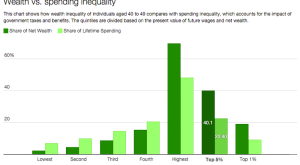In The Great Leveler, Walter Scheidel argues that over thousands of years, only mass violence and catastrophes have triggered significant reductions in inequality. From the book’s introduction: For thousands of years, civilization did not lend itself to peaceful equalization. … stability favored economic inequality. This was as true of Pharaonic Egypt as it was of Victorian England, as true of the Roman Empire as of the United States. … Four different kinds of violent ruptures have...
Read More »Trade and Wage Inequality
In a CEPR discussion paper, Elhanan Helpman concludes that trade played an appreciable role in increasing wage inequality, but that its cumulative effect has been modest, and that globalization does not explain the preponderance of the rise in wage inequality within countries.
Read More »Determinants of (Low) Real Interest Rates
On his blog, James Hamilton summarizes a Bank of England working paper by Lukasz Rachel and Thomas Smith on the determinants of low real interest rates.
Read More »Polarized Labor Markets
In the NZZ, Thomas Fuster and Jürg Müller interview David Autor. Autor on polarization: Der Arbeitsmarkt wird immer polarisierter. Auf der einen Seite haben wir viele gutbezahlte, hochqualifizierte und interessante Stellen. Auf der anderen Seite stehen schlechter entlöhnte und niedrigqualifizierte Stellen, bei denen es quasi darum geht, dem Wohl und Komfort der Wohlhabenden zu dienen. Das ist keine gesunde Entwicklung. Sie schlägt Stufen aus der Leiter des wirtschaftlichen Aufstiegs. Das...
Read More »Dynamics of the World Income Distribution
In a Resolution Foundation report, Adam Corlett examines the “Elephant Curve.” The curve shows that between 1988 and 2008 income growth in the 70th to 95th percentile range of the world income distribution was much lower than for almost all other percentiles. Since the lower middle class of rich countries is situated around the 80th percentile of the distribution the Elephant curve has been interpreted as evidence for stagnating middle class incomes in the rich countries. Corlett...
Read More »America’s Class Distinctions
In the FT, Edward Luce writes about America’s class distinctions. The real story, as depicted by historian Nancy Isenberg, author of White Trash, is that America was founded amid highly conscious class distinctions. African slaves were not the only group to be disenfranchised. … It would be difficult to read America’s history — or decode the 2016 presidential election — without reference to the struggle between poor whites and the descendants of former slaves. Lyndon Baines Johnson, who...
Read More »Taxing the Rich
In Taxing the Rich: A History of Fiscal Fairness in the United States and Europe, Kenneth Scheme and David Stasavage explore the intellectual and political debates surrounding the taxation of the wealthy while also providing the most detailed examination to date of when taxes have been levied against the rich and when they haven’t. Fairness in debates about taxing the rich has depended on different views of what it means to treat people as equals and whether taxing the rich advances or...
Read More »Inequality and the Welfare State
A new book on inequality by Branko Milanovic adopts an international perspective. The Economist reviews the book: Like Mr Piketty, he begins with piles of data assembled over years of research. He sets the trends of different individual countries in a global context. Over the past 30 years the incomes of workers in the middle of the global income distribution—factory workers in China, say—have soared, as has pay for the richest 1% (see chart). At the same time, incomes of the working class...
Read More »Spending Inequality
In a New Republic blog, Alan Auerbach and Larry Kotlikoff discuss lifetime spending inequality. Due to taxes and income variability over the life cycle, this is much smaller than wealth or income inequality. Auerbach and Kotlikoff write: The top 1 percent of 40-49 year-olds face a net tax, on average, of 45 percent. … For the bottom 20 percent, the average net tax rate is negative 34.2 percent. … Our standard means of judging whether a household is rich or poor is based on current income....
Read More »Global Wealth and the Long-Term Investor
How wealthy has China become? At last count, the country accounted for a full 8 percent of all global ultra-high net worth investors—those worth more than $50 million. What will those UHNWIs do with that newfound wealth? That’s an important question, because household wealth is a key driver of consumers’ consumption and investment decisions as well as entrepreneurial activity, and that holds true whether one is Chinese, American, or otherwise. China and the United States led the...
Read More » Swiss Economicblogs.org
Swiss Economicblogs.org

